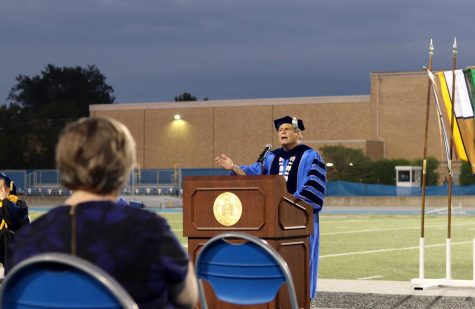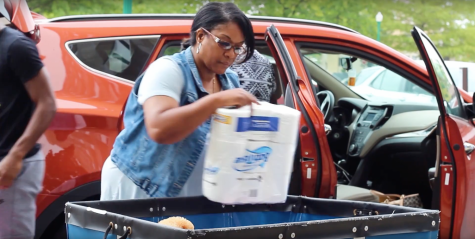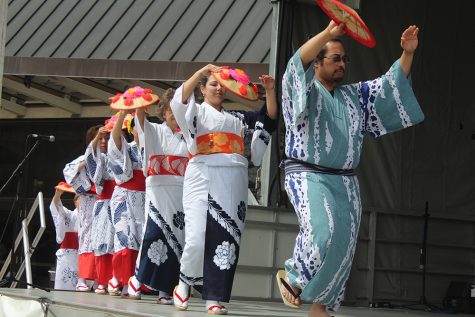Hammersmith for EIU presidency
Eastern presidential hopeful and past provost and vice chancellor for Academic Affairs Sue Hammersmith spoke in an open forum this past Friday on her ideas for the position. Eastern’s next president is supposed to be decided by the end of the week.
For podcasts with presidential candidates Blair Lord and William Perry
For stories with Lord and Perry
Hammersmith ready to collaborate
Sue Hammersmith has fallen in love with Eastern.
The presidential hopeful was searching Eastern’s Web site to learn more about the university, and saw Kim, the student featured on the home page, but paid more attention to the photo’s text.
“I love EIU.”
Hammersmith loved the idea.
Every student should be able to feel that way, she said.
She is the last of the final three presidential candidates to be on campus, and interviewed with students, faculty and staff in a series of meetings Friday.
She is the provost and vice chancellor for academic affairs at the University of Wisconsin-Green Bay.
Her duties include managing about 85 percent of the university’s budget, working with information technology staff, student housing staff and academic faculty. She described it as “rowing the boat,” by keeping the campus running.
The president has to “chart the course” and have a vision, she said.
Hammersmith said all the universities she has worked at have been similar to Eastern since all have large undergraduate programs and small graduate programs.
She has found that working collaboratively is much more effective than working alone. She said this is a great way to counteract the drift that can develop between student affairs and academic affairs.
“I believe in the idea of collective intelligence,” she said.
Planning committees on campus should decide issues like capping enrollment or making the institution more selective, she said.
She explained that the president, no matter who it is, cannot be as smart as all of the people in the university, so the president should rely on others to help them make decisions.
Hammersmith gave general, sometimes vague, answers to some of the audience questions. She said she didn’t know the institution or area very well. That is her first priority for work, she said.
Her advantages over the other two candidates include her high energy and strong work ethic, she said.
She has been told she is good with conflict resolution, and is aware of the worth of time used to work out differences.
Greg Staton, a realtor, said that he could sense her sensitivity.
Hammersmith readily confessed her imperfection.
“If I have one flaw, it may be that I am too open,” she said.
Hammersmith was asked about her role as a finalist for another presidential position at University of Pennsylvania. When asked which job she would prefer, she hesitated.
“I won’t answer your question,” she said.
But she did offer some personal information.
“Well, my brother keeps telling me that I would only be two hours and 23 minutes away from his house,” she said.
Her mother would be a little more than three hours away. She has two daughters who live in Indiana.
But she said there was more than just geography behind her decision to work at Eastern.
“You have a good university,” she said.
If hired, Hammersmith said one of her first tasks would be putting on a T-shirt and helping with move-in day – a good way to be visible and get in contact with students.
Jill Nilsen, vice president for external affairs, said she was very pleased with campus participation and how well the process works.
“I think (the turn out) speaks to how important this process is,” both inside and outside the university, she said.
The student meeting had 24 people and the campus meeting had 44 when they began, with people trickling in throughout.
Hammersmith said she thinks there are many ways to ensure that students are involved with their campus.
She mentioned Greek Life, athletics and the arts as ways for students to be involved. Hammersmith thinks this is although part of being a college student is learning intelligently, an important part is about learning social interaction.
It is good that Eastern is not a commuter campus, she said, since that helps with learning about human interaction.
To improve student involvement, Hammersmith mentioned a few plans. One was to have programming on weekends to encourage students to stay on campus.
Hammersmith said a university needs “a campus life students want.”
She gave the example of a coffee house that was built on Green Bay’s campus. Students helped plan and design the conversion of a lounge into the coffee house. Now it’s is packed every day, she said. Additions to campus that students want is crucial to avoid entirely becoming a “suitcase school.”
Hammersmith also addressed the state of higher education.
“Higher education is at a real challenge,” she said, mostly because of the reduction in funding from the state.
In ensuring funding, Hammersmith said the president has an external role, mostly to deal with private and corporate donors.
The president should have people they can rely on in campus so the president can focus on external duties when needed.
She was quick to point out that a president needs to remain visible on and connected to the campus.
Hammersmith thinks that a liberal arts education is still “vital.”
“It is job training,” she said.
When asked about problems she has seen on campus so far, Hammersmith brought up the deferred maintenance on campus. These are projects that need to be completed, but have not, commonly due to budget restraints.
She also said there has not been enough support from the state for higher education. She said higher education needs to “remind people of the return on their investment.”
Another topic addressed was how much focus Chicago receives in Illinois. She suggested that Western, Eastern and Southern get together to help balance Chicago’s influence. Right now, the rest of the state sometimes feels left out, she said.
She described Eastern’s promotional budget as “teeny tiny” and that it should be expanded. This would help the president increase awareness of the university, something she feels is a major flaw.
She said someone told her that “Eastern was the best-kept secret” in Illinois.
“I see Eastern going to the next level,” she said if she takes over. She wants to focus on new programs and the lack of recognition of Eastern.
“You’re not an institution struggling to decide who they want to be when they grow up,” Hammersmith said.
That is why she thinks Eastern does not need drastic changes. “You have so many things just right,” she said.
Kent Ohms, a junior political science major, asked Hammersmith about her personal philosophy on higher education.
“It’s good,” she said with a laugh.
She went on to say it is vital for a democracy and strong economy.
When asked about Eastern’s focus on teaching, Hammersmith said that it is important to balance research and teaching since they strengthen one another.
Professors have spoken to her about their heavy teaching load, which makes research difficult. Hammersmith thinks a balance can be reached.
The president should let the provost run academic affairs, but the president should encourage faculty to balance their research and teaching commitments, she said. Faculty should also be aware of the stages of their careers.
As an example, faculty trying to get tenure should focus on research, while older faculty should allow their younger colleagues time to research by doing more teaching.
When asked about private fundraising, she said it is based on a personal relationship. She compared it to a couple, where one spouse has to travel and visit the other. “They don’t give to a proposal or hypothesis, they give to an institution,” Hammersmith said.
Staton said the program was a good idea since the president is critically important to the community.
Forum attendees were encouraged to fill out a comment form to return to the Presidential Search Advisory Committee.
“I expect we will see thousands of responses,” said Amanda Raz, student representative on the committee.

















![[Thumbnail Edition] Senior Foward Macy McGlone, getsw the ball and gets the point during the first half of the game aginst Western Illinois University,, Eastern Illinois University Lost to Western Illinois University Thursday March 6 20205, 78-75 EIU lost making it the end of their season](https://www.dailyeasternnews.com/wp-content/uploads/2025/03/WBB_OVC_03_O-1-e1743361637111-1200x614.jpg)



















































